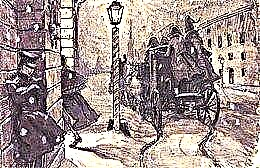The immortal comedy of Alexander Griboedov “Woe from Wit” had a great influence on the upbringing of many generations of Russian-speaking people. In order to show us all these vices in a more expressive and vivid form, the author uses a favorite tool - satire, with which he increases the defining features of his characters to the maximum, making them hilarious, but not so much as to be too divorced from reality. This gives a characteristic bitter aftertaste after reading this play - we understand that the heroes of the plot are often ourselves, we just don’t notice our shortcomings from the outside.
The action begins with the fact that the main character, Alexander Andreevich Chatsky, arrives in Moscow after three years of absence and comes to visit Famusov’s house for one interesting reason. The fact is that Chatsky is in love with the daughter of the owner of the house, Sophia. Before Chatsky's departure from Moscow, there was close friendship between them, the girl shared many of his views. Together they laughed at the young aunt, the love of Father Sophia for the English club. However, after his return, he saw not at all the girl that he once knew. During these three years, Sophia has changed, she has become more conservative in her views, she no longer jokes with him, as before. All his attempts to initiate a fun and easy conversation ended in failure, Sophia rejects even his slight smiles at present Moscow, about the rules existing in the present society.
The author makes it clear to us that Sophia’s character has changed over the course of three years, because Chatsky did not see or speak with her for three years. She changed under the influence of the environment, and it was with that environment that changed the girl and leads her struggle Griboedov in the play. He does it expertly and uses numerous tricks: satire, parody, grotesque. This makes the work “Woe from Wit” a truly great work of Russian literature. He tells us about serfdom ossified in spiritual poverty, about the cruelty and greed of the "noble kingdom." The author laughs at the mask of the outward splendor of this deceitful society, where people are heart-to-heart and often lose to cards, or change to greyhounds. He reveals to us the true disgusting appearance of landowners who live all their lives in “feasts and revelry”, and people who strive for science and art are ridiculed and afraid, and enlightenment itself is called the “plague”. And this is supported at the level of the whole country, the author sees the scale of the problem, they are huge, the consequences are inevitable. In the world that makes fun of Griboedov, a person is valued not by his mind, but by his titles, titles and money that he has, and it does not matter how these privileges are obtained and wealth is accumulated.
In the center of all this “feast during the plague” we see the Moscow gentleman Pavel Afanasevich Famusov, Colonel Skalozub, the “sinister old woman” Khlestov, Molchalin and Zagoretsky. Griboedov laughs at stupidity, bigotry, complacency Famusov. Father tells Sofya that he has impeccable behavior and reputation, but he immediately gathers for a christening to a certain widow who has not yet given birth, but according to his calculations, “she must give birth”. The best friend of Pavel Afanasevich is a dumb soldier and book-hater Colonel Skalozub Sergey Sergeevich. Famusov himself describes him as a star of a mazurka and bassoon, and it becomes obvious to us that this officer spends many hours dancing in balls and feasts. He is an ardent opponent of all enlightenment and sanity. He promises to give Volatsky to Chatsky, but he does not keep the promise, and taking this opportunity, blackmails him, offering the sergeant mockery. He speaks of books with disdain and fear, believes that it would be better to burn them all.
Opinion about Colonel Skalozub - this is perhaps the only thing about which the opinions of Chatsky and Sophia still agree. She speaks of the colonel as a fool, and agrees that he did not speak a smart word for a while.
Another friend and comrade of Famusov is Alexei Stepanovich Molchalin, an eternal sneak and trying to please everyone. His father taught him from a young age: in order to succeed, everyone should be flattered and succumbed to, even "a janitor's dog so that it is affectionate." And Aleksei Stepanovich successfully fulfills his father's orders, becomes an offspring, a vivid example of Famus society.
Next to Famusov, we see the old woman Khlestova, a tough, rude, imperious lady. She is so mired in her “games” and cruelties that it seems comical to the reader. Near her, as with Famusov, one can often meet Anton Antonovich Zagoretsky, who is always ready to serve both in any business. And not one, not the second, his moral qualities do not bother. He is a thief, a liar, a flatterer and a gambler. Moreover, Khlestova herself admits that she is afraid of him, and locks the doors from him so that he does not steal, but she keeps it to herself anyway, because he is “a master of service”.
With these words, Khlestova very accurately gives a characterization to herself and to all people in her environment: vile, deceitful, uneducated and greedy. And the whole world is confronted by one Chatsky, who is forced to fight alone with those vices that he meets everywhere. It seems ridiculous to him to be an empty, slavish imitation of Western fashion, which comes to the comic not only in clothing, but also in the ability to speak and to hold oneself. He calls the language universally used by the heroes of the play the displacement of the “French language from Nizhny Novgorod,” and the blind worship of the entire Famus society by chance visiting the “Frenchman from Bordeaux” causes him indignation and contempt. Chatsky sincerely does not understand why people with such a rich personal culture and centuries-old traditions, so blindly imitate the culture of overseas, indiscriminately trying on everything that does not come to hand.
The comedy “Woe from Wit” is a whole era in Russian literature and Russian theater. The play will undoubtedly remain one of the main treasures of Russian literature and culture. Young writers have studied and are still studying this play, using the art of satire, realistic biography and vibrant, spoken Russian. A lot of quotes from “Woe from Wit” became proverbs, catchphrases that have taken root in the Russian language, thereby ensuring the immortal fame of comedy and its author.












